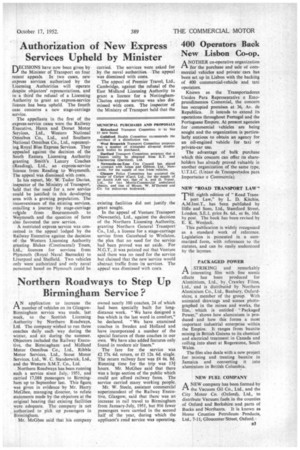Northern Roadways to Step Up Birmingham Service ?
Page 37

If you've noticed an error in this article please click here to report it so we can fix it.
A N application to increase the Pl. number of vehicles on its GlasgowBirmingham service was made, last week, to the Scottish Licensing Authority by Northern Roadways, Ltd. The company wished to run three coaches daily each way during the winter, and six during the summer. Objectors included the Railway Executive, the Birmingham and Midland Motor Omnibus Co., Ltd., Ribble Motor Services, Ltd., Scout Motor Services, Ltd., W. C. Standerwick, Ltd., and the Western S.M.T. Co., Ltd.
Northern Roadways has been running such a service since July,' 1951, and carried 17,088 passengers to Birmingham up to September last. This figure was given in evidence by Mr. Harry McGhee, managing director, to refute statements made by the objectors at the original hearing that existing facilities were adequate. The company is not authorized to pick up passengers in Birmingham.
Mr. McGhee said that his company owned nearly 100 coaches, 24 of which had been specially built for longdistance work. "We have designed a bus which is the last word in comfort," he declared, "We have examined coaches in Sweden and Holland and have incorporated a number of the special features of those coaches in our own. We have also added features only found in modern air liners!'
The fare for the service was £2 17s. 6d. return, or El 12s. 6d. single. The return railway fare was £4 6s. 8d. Running time for the trip was 131 hours. Mr. McGhee said that there was a large section of the public which could not afford railway fares. The service carried many working people.. Mr. W. Steele, assistant commercial superintendent of the Railway Executive, Glasgow, said that there was an increase in rail travel to Birmingham from January-July, 1951, but 916 fewer passengers were carried in the second half of the year, during which the applicant's road service was operating.




















































































